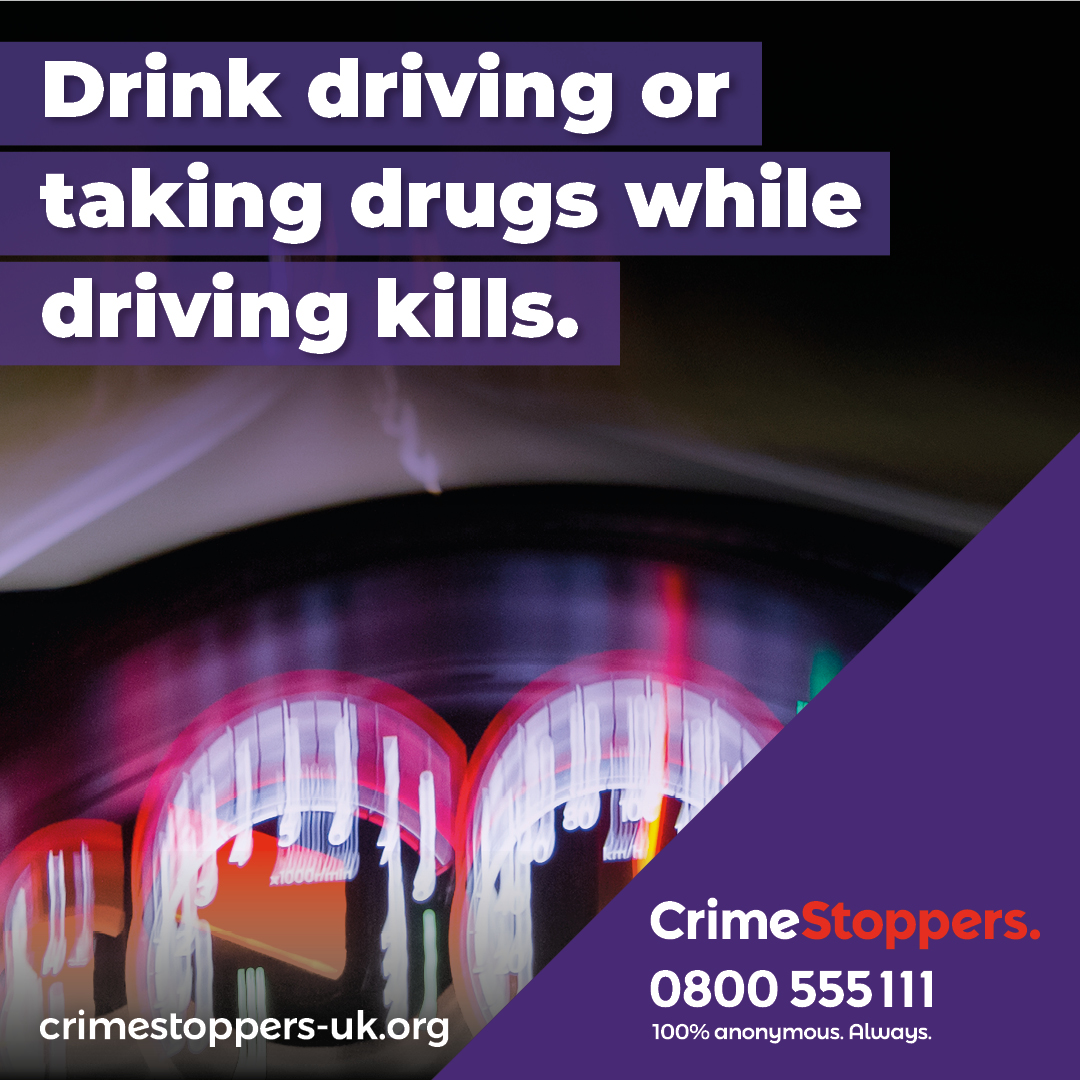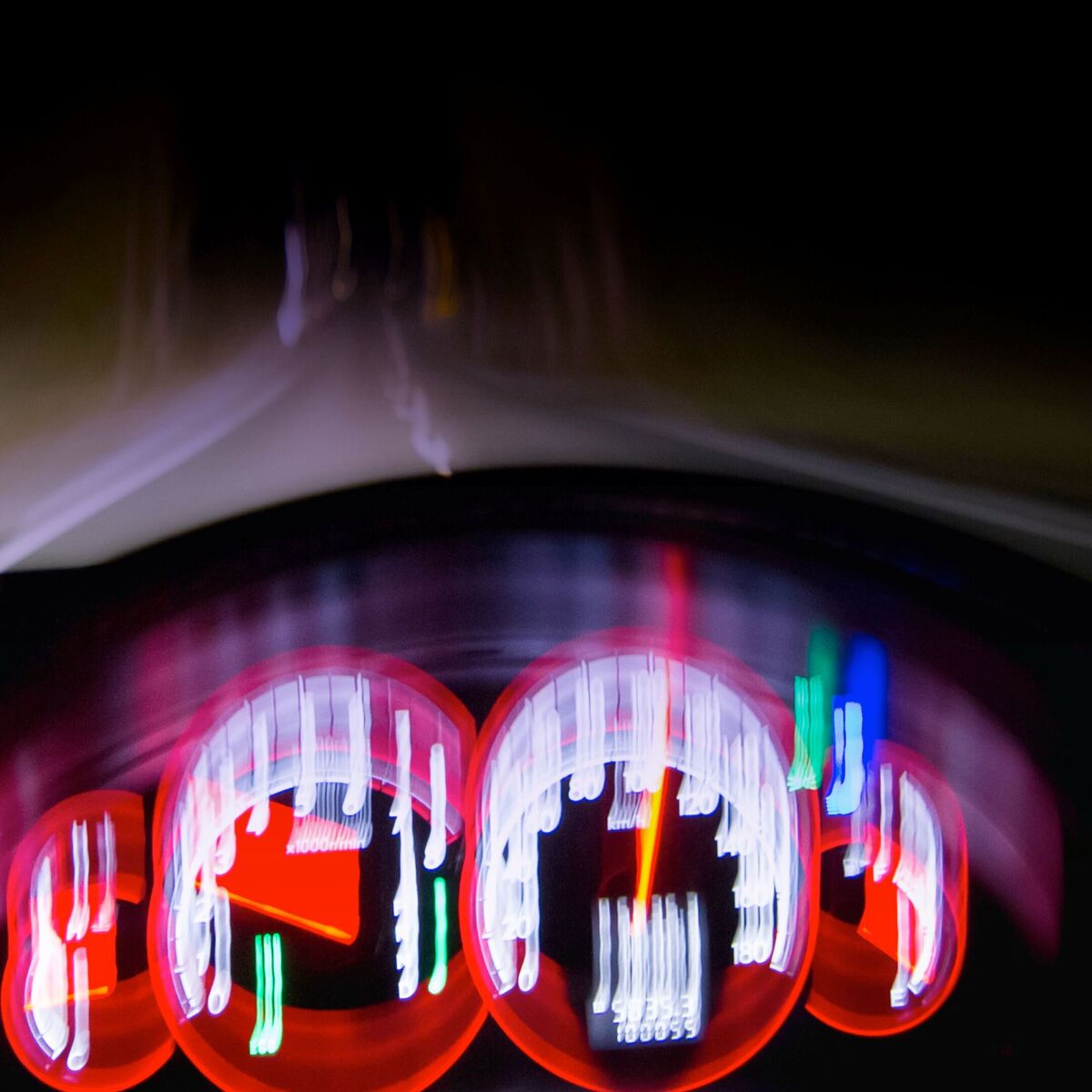Drink and drug driving
Help put the brakes on drink and drug driving.
Remember - in an emergency, always call 999.
If you suspect someone is drink or drug driving regularly, tell us what you know, 100% anonymously.
Call free on 0800 555 111 or fill in our secure quick & easy online form:
Give information anonymously
Alcohol and drug drivers put other people’s lives at risk. Your information really can make a difference:
Regular drug driver arrested: Crimestoppers received information on a person who regularly drove their vehicle every morning whilst under the influence of drugs. The vehicle was stopped by police and the driver was saliva-tested for drugs, which resulted in a positive indication for cannabis. When searched, they were found to be in possession of a small white bag believed to be cocaine and a small amount of cannabis. The driver was arrested.
What you tell us could help prevent a collision from happening - it could even help save lives.
The facts:
Drink and drug driving in the UK devastates lives.
- Government data reveals that between 290 and 320 people are killed annually in vehicle collisions involving drivers over the legal alcohol limit.
- Approximately 1 in 5 fatal road collisions involve a driver or rider impaired by alcohol or drugs.
- Between 2014 and 2023, drug-driving fatalities rose 164%: from 47 deaths up to 124.
- For the same dates, overall collisions attributed to drug driving increased by 170%, from 684 up to 1,853 in 2023.
- In 2024, drug-driving convictions rose by 13.5% to nearly 27,000, compared to the previous year, showing increases in both incidents and enforcement.
- The most commonly detected drugs in deceased drivers are cocaine and cannabis, with younger adults (20-29) most often affected.
- The National Police Chiefs' Council has stated that every Christmas, in a unified effort, police forces ramp up efforts to catch drink and drug drivers.
- In 2024, the operation conducted nearly 60,000 breath tests, with 9.7% testing positive for alcohol and a shocking 42.2% testing positive for illegal drugs.
- 6,931 arrests were made for drink and drug driving offences, with 2,782 drivers being arrested for both drink and drug driving offences - almost double the number from previous years’ national operations.
- Tests following a collision showed 14.5% of motorists testing positive for alcohol, the highest in these circumstances since 2019.
In 2023, we at Crimestoppers received nearly 56,000 reports about people regularly driving while under the influence of alcohol and or drugs, a 22% increase from the previous year - an average of 153 reports of information being received per day.
What can you do to make a difference?
We appreciate that if you’re close to someone who gets behind the wheel regularly whilst under the influence of alcohol or drugs, it can be difficult to come forward.
It could be a work colleague, a neighbour, or even a family member or a friend. This can explain why some people are reluctant to go to the police, because of the fear of being identified.
We want to raise awareness of the dangers of drink and drug driving and encourage anyone who has information on a repeat or suspected offender to speak up.
Give information 100% anonymously on 0800 555 111 or online:
We don’t want to know who you are, just what you know.
- Who the person is and what they look like.
- Where do they drink or take illegal drugs?
- What the substance is and the extent of use.
- Where they park whilst abusing substances or drinking alcohol.
- Where they drive to and from.
- Times they are driving.
- Car make, model, registration number.
- Is the suspected offence habitual?
- Are there passengers in the car?
For advice and support for alcohol abuse for you or a loved one, visit drinkaware.co.uk.
For advice and support on drug abuse for you or a loved one, talktofrank.com.
Alcohol and drug driving and the law
In England, Wales and Northern Ireland the drink drive limit is:
- 80 milligrams of alcohol per 100 millilitres of blood.
- 35 micrograms per 100 millilitres of breath.
- 107 milligrams per 100 millilitres of urine.
In Scotland, the legal amount you can drink before driving is:
- 50 milligrams of alcohol in every 100 millilitres of blood.
- The breath alcohol equivalent is 22 micrograms of alcohol per 100 millilitres of breath.
People often think in terms of Units of Alcohol, so here is some guidance on these.
It’s illegal to drive with drugs if either:
- You’re unfit to do so because you’re on legal or illegal drugs.
- You have certain levels of illegal drugs in your blood (even if they have not affected your driving).
Legal drugs are prescription or over-the-counter medicines. If you’re taking them and not sure if you should drive, talk to your doctor, pharmacist or healthcare professional.
Drink and drug driving issues
It’s illegal in England, Scotland and Wales to drive with legal drugs in your body if it impairs your driving.
It’s an offence to drive if you have over the specified limits of certain drugs in your blood and you have not been prescribed them.
Talk to your doctor about whether you should drive if you’ve been prescribed any of the following drugs:
- Amphetamine, for example Dexamphetamine or Selegiline
- Clonazepam
- Diazepam
- Flunitrazepam
- Lorazepam
- Methadone
- Morphine or opiate and opioid-based drugs, for example Codeine, Tramadol or Fentanyl
- Oxazepam
- Temazepam
You can drive after taking these drugs if:
- You’ve been prescribed them and followed advice on how to take them by a healthcare professional.
- They are not causing you to be unfit to drive, even if you’re above the specified limits.
You could be prosecuted if you drive with certain levels of these drugs in your body and you have not been prescribed them.
The law does not cover Northern Ireland - but you could still be arrested if you’re unfit to drive
Although many people think they are driving safely, alcohol impairs their judgement, reaction times and sense of reality.
It affects driving ability by causing:
- Delayed reaction times.
- Blurred vision.
- Drowsiness.
- Inability to think, reason or plan ahead.
- Reduced concentration.
- Reduced ability to interpret road signs and speed limits.
- An inability to judge your position on the road, making it easy to cross the centre line etc.
- Impaired assessment of risk.
The only safe limit is no alcohol.
How the body processes alcohol differs from person to person, and this depends on a number of factors:
- Amount and type – how much alcohol has been taken how quickly.
- Age – younger people have lower alcohol tolerance, coupled with a lack of driving experience.
- Weight/size – the smaller you are, the lower your blood volume is likely to be and alcohol may affect you more.
- Gender – women are typically smaller and have proportionately more body fat and less body water than men, so drinking the same amount of alcohol is likely to result in a higher blood alcohol concentration.
- Water intake – dehydration leads to a higher concentration of alcohol in the blood.
- Food intake – alcohol is absorbed more slowly if there is food in the body.
If you take drugs as well as alcohol, your ability to drive safely will be affected even more, increasing further your risk of being involved in a collision.
Different drugs affect driving differently, and people can also react to drugs differently.
The type of drug, the dosage, the length of time in the user's body, as well as the user themselves, all impact on how much a driver is affected.
A drivers’ attentiveness, perception of time and speed, as well as coordination and judgement can all be affected when using drugs.
Drug drivers can experience a range of effects, including:
- An inability to notice hazards.
- Lower reaction times.
- Erratic, aggressive and risk-taking behaviours.
- An inability to concentrate properly on driving tasks.
Drugs may also cause:
- Nausea.
- Hallucinations.
- Confusion.
- Panic attacks.
- Paranoia.
- Tremors.
- Dizziness.
- Fatigue.
If alcohol has also been consumed, this will further increase the risk of being in a collision.
Drugs that can be tested for at the roadside are cannabis and cocaine, while the evidential laboratory test can identify all the drugs covered by the law, including ecstasy, LSD, ketamine and heroin.
Police now make use of drug wipe and saliva testing kits to catch those who are unfit to drive having taken drugs. This has led to an increase in convictions.
If you are pulled over by the police on suspicion of drink driving, police officers will first use a breathalyser to establish whether or not you are over the limit. This is called a preliminary test.
There are also two other tests:
- A preliminary field impairment test, which checks whether someone is unfit to drive because he or she is under the influence of either drink or drugs.
- A preliminary drug test. This tests whether a person is unfit to drive because they are under the influence of drugs.
The field impairment test could include the police asking you to perform a balancing exercise, doing a non-invasive eye test, and/or co-ordination exercises.
A preliminary test can be requested either when the police officer reasonably suspects a defendant is driving, has driven or will drive, or be in charge of a vehicle, and reasonably believes a defendant was driving, attempting to drive or be in charge of a vehicle at the time of an accident.
Legal Guidance on Road Traffic - Drink and Drug Driving (for England & Wales)
if you see someone attempting to drive whilst intoxicated, call 999.
Give information 100% anonymously on 0800 555 111 or online:

Give information
Give information anonymously by phone on 0800 555 111 or online

Donate to us
Join our fight against crime by making us a donation today, and see how the money you give can help shape your community for the better.

Fearless - our youth service
Find out about Fearless, Crimestoppers' youth service for 11-17 year olds.
